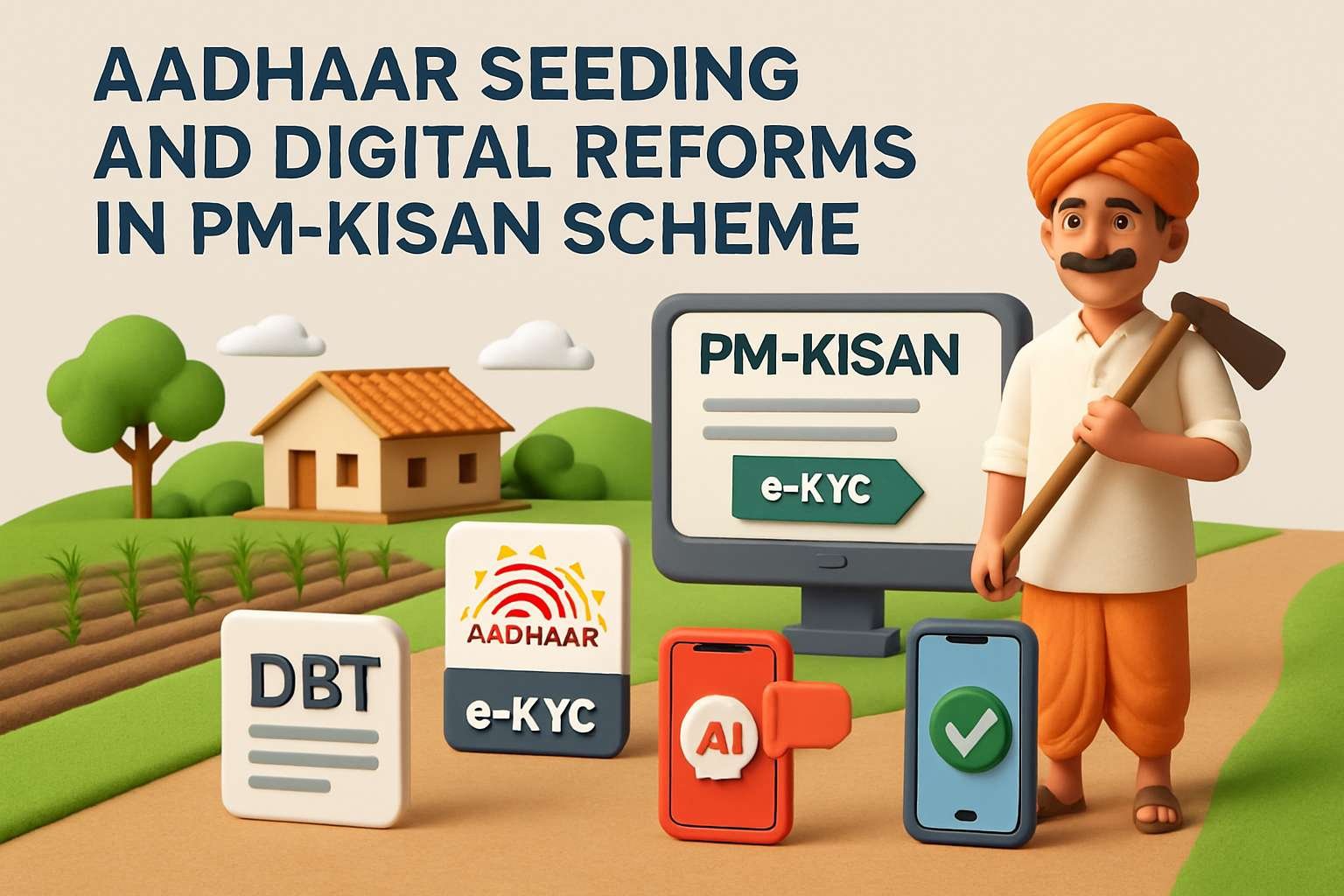Aadhaar Seeding and Digital Reforms in PM-KISAN Scheme
The Pradhan Mantri Kisan Samman Nidhi (PM-KISAN) is a centrally sponsored scheme launched by the Hon’ble Prime Minister in February 2019. Its primary goal is to support the financial needs of farmers with cultivable land across India.
Under this scheme, ₹6,000 per year is transferred directly to eligible farmers’ Aadhaar-linked bank accounts in three equal installments via Direct Benefit Transfer (DBT).
Core Eligibility: Cultivable Land
The most essential eligibility requirement for PM-KISAN benefits is ownership of cultivable land. The scheme, however, excludes individuals who fall under certain high-income categories, such as income tax payers, institutional landholders, and government officials.
Elimination of Middlemen through Farmer-Focused Digital Infrastructure
One of the most praised aspects of the PM-KISAN scheme is its technology-driven approach. The Government of India has designed the system to ensure that no middlemen are involved, and the funds reach genuine farmers directly.
Since its inception, more than ₹3.90 lakh crore has been distributed across 20 installments, ensuring complete transparency in registration and verification of beneficiaries.
How the System Works: Verified Data and DBT
Benefits are transferred to farmers only after states/UTs submit verified data to the PM-KISAN portal. To make the process more efficient and error-free, several tech integrations have been introduced:
- PFMS (Public Financial Management System)
- UIDAI (Aadhaar infrastructure)
- Income Tax Department data
- Real-time e-KYC and Aadhaar seeding
- Mandatory land record digitization and linking
These efforts have made the system faster, transparent, and highly secure.
Importance of Aadhaar-Based Payments
From the 13th installment (December 2022–March 2023) onwards, Aadhaar-based payments have been made mandatory. This means the benefit will only be credited to a bank account that is linked with the farmer’s Aadhaar number.
This change has addressed previous challenges such as:
- Data entry errors during bank mergers
- Account number changes
- Identity mismatches
As a result, by the 19th installment, the scheme achieved a 99.92% transaction success rate — a major milestone in DBT efficiency.
What Happens If a Transaction Fails?
In rare cases of failed transactions, the system reprocesses them periodically. Most transaction failures occur due to:
- Aadhaar de-seeding by the bank from NPCI mapper
- Aadhaar not mapped with the account
- Closed bank account
In such cases:
- Farmers and respective State/UTs are alerted
- They are advised to correct the errors immediately
- Once corrections are done, payments are released in the next cycle
Grievance Redressal Mechanism for Farmers
To ensure prompt resolution of farmers’ issues, the government has implemented several complaint redressal platforms:
- CPGRAMS portal
- PM-KISAN portal
- Physical receipts and email correspondence
Introduction of AI-Powered “Kisan e-Mitra” Chatbot
Taking farmer support to the next level, the government launched an AI-based “Kisan e-Mitra” chatbot in September 2023.
Key features:
- Available 24×7
- Answers queries in 11 Indian languages: English, Hindi, Odia, Tamil, Bengali, Malayalam, Gujarati, Punjabi, Kannada, Telugu, and Marathi
- Available across web and mobile platforms
- Offers quick, accurate, and clear responses
As of 15 July 2025, this chatbot has successfully resolved over 9.5 million queries from 5.3 million farmers, making it one of the most impactful AI-driven services for Indian agriculture.
The PM-KISAN scheme has gone beyond just financial aid. It represents a digital transformation in farmer welfare, backed by Aadhaar, AI, and DBT. Mandatory Aadhaar seeding ensures that each rupee reaches the rightful farmer—eliminating fraud, improving transparency, and empowering the agricultural community.
NOTE : If you’re a farmer or know someone who is eligible but hasn’t linked their Aadhaar yet—act now. Complete your e-KYC and Aadhaar seeding to ensure you never miss your PM-KISAN installment.
Read Also :-
What’s Changing in India’s Fertilizer Strategy 2025? Big Reforms Farmers Must Know!
Bird Deaths and Wind Energy in India: A Silent Crisis in Clean Power
Global Plastic Profiles 2025: The $28 Billion Industry You Never Noticed


This is the kind of quality content I love to see.